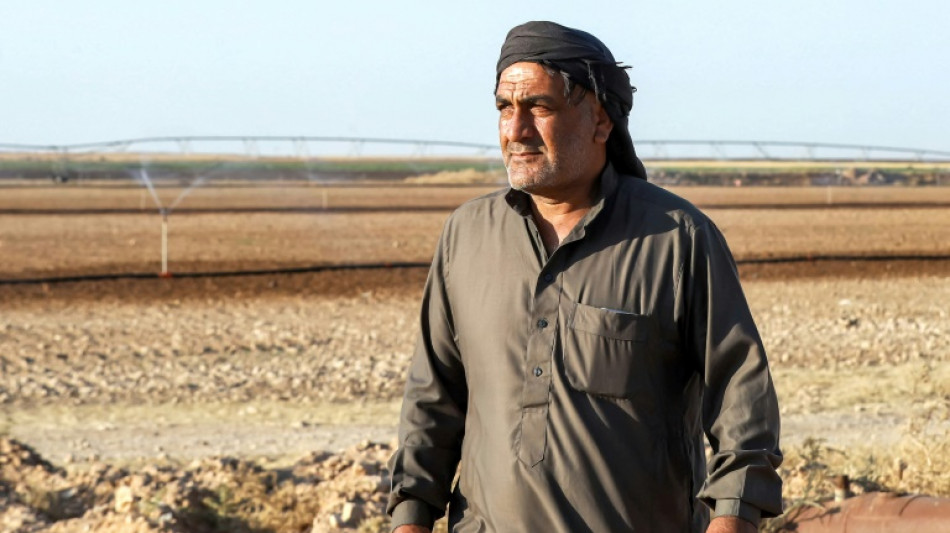
-
 US private sector hiring rebounds in December but misses expectations
US private sector hiring rebounds in December but misses expectations
-
Giro d'Italia champion Yates announces shock retirement

-
 US attempts to seize Russia-flagged oil tanker in Atlantic
US attempts to seize Russia-flagged oil tanker in Atlantic
-
Warner Bros rejects updated Paramount takeover bid, backs Netflix deal

-
 Brigitte Bardot buried in Saint-Tropez as cause of death revealed
Brigitte Bardot buried in Saint-Tropez as cause of death revealed
-
'I don't': AI wedding vows fall foul of Dutch law

-
 German emissions cuts slow, North Sea has warmest year on record
German emissions cuts slow, North Sea has warmest year on record
-
France's Lucu a doubt for Six Nations opener

-
 Could Trump's desire for Greenland blow up NATO?
Could Trump's desire for Greenland blow up NATO?
-
Reigning champion Al-Rajhi abandons Dakar Rally

-
 UN accuses Israel of West Bank 'apartheid'
UN accuses Israel of West Bank 'apartheid'
-
US, Ukraine teams tackle 'most difficult issues' in Russia war talks: Zelensky

-
 Trump says Venezuela to hand over oil stocks worth billions
Trump says Venezuela to hand over oil stocks worth billions
-
Slot says Liverpool can still do 'special things' ahead of Arsenal clash

-
 Brigitte Bardot to be buried in Saint-Tropez as cause of death revealed
Brigitte Bardot to be buried in Saint-Tropez as cause of death revealed
-
Iran executes man on Israel spying charges: judiciary

-
 O'Neil succeeds Rosenior as Strasbourg coach
O'Neil succeeds Rosenior as Strasbourg coach
-
Slot says Liverpool can still do 'special things'

-
 Europe faces transport chaos as deadly cold snap persists
Europe faces transport chaos as deadly cold snap persists
-
Bangladesh in talks with ICC over fate of cricket World Cup games

-
 Bardot to be buried in Saint-Tropez as cause of death revealed
Bardot to be buried in Saint-Tropez as cause of death revealed
-
England's brilliant Bethell savours 'very special' maiden century

-
 Lenovo unveils AI agent to bridge PCs, phones and wearables at CES
Lenovo unveils AI agent to bridge PCs, phones and wearables at CES
-
Gauff drags US into United Cup semis as Swiatek also wins

-
 Oil extends losses as Trump flags Venezuela shipments, stocks mixed
Oil extends losses as Trump flags Venezuela shipments, stocks mixed
-
Medvedev extends strong start to season ahead of Australian Open

-
 Bethell slams maiden century to leave final Ashes Test on knife edge
Bethell slams maiden century to leave final Ashes Test on knife edge
-
Nollywood meets Bollywood: filmmaker fuses Indian, Nigerian culture

-
 India women's historic cricket World Cup win fires up T20 league
India women's historic cricket World Cup win fires up T20 league
-
South Korea's Lee says urged Xi to help curb North's nukes

-
 England's Bethell hits maiden Test century as family watch on
England's Bethell hits maiden Test century as family watch on
-
US car market expected to moderate in 2026

-
 Swiatek, Gauff ease to United Cup victories
Swiatek, Gauff ease to United Cup victories
-
Strasbourg face pitfalls of multi-club system as Chelsea take Rosenior

-
 Bethell stands tall as England 174-3 in final Test, nine behind
Bethell stands tall as England 174-3 in final Test, nine behind
-
Ex-CIA agent convicted of spying for Soviets dies in prison

-
 James, Doncic carry Lakers past Pelicans
James, Doncic carry Lakers past Pelicans
-
Vietnamese caught in Japan's illegal worker crackdown

-
 Nostalgia and new fans as Tamagotchi turns 30
Nostalgia and new fans as Tamagotchi turns 30
-
Oil extends losses as Trump flags Venezuela shipments, stocks wobble

-
 Overseas scholars drawn to China's scientific clout, funding
Overseas scholars drawn to China's scientific clout, funding
-
From music to mind reading: AI startups bet on earbuds

-
 'Of course it's not safe': small city in Russia tries to shrug off war
'Of course it's not safe': small city in Russia tries to shrug off war
-
'Simple' goodbye to Bardot lined up in Saint-Tropez

-
 England lose Crawley as they battle to save final Ashes Test
England lose Crawley as they battle to save final Ashes Test
-
Nvidia CEO praises robots as 'AI immigrants'

-
 Talks on Ukraine guarantees to continue after Paris 'progress'
Talks on Ukraine guarantees to continue after Paris 'progress'
-
Medical Care Technologies' Infinite Auctions to Offer Original Art by Iconic Artist Rob Prior Signed by Stan Lee, Chris Evans, Al Pacino & More

-
 American Antimony Corp. Executes First MTA Milestone with Delivery of 400 kg of Nevada-Sourced High-Grade Antimony Ore
American Antimony Corp. Executes First MTA Milestone with Delivery of 400 kg of Nevada-Sourced High-Grade Antimony Ore
-
ABO Capital Rebrands Complexo Escolar Privado Internacional Schools to 'Maple Bear Angola,' Marking Continued Growth in Global Education


Syrian farmers abandon the land for steadier jobs
After years of war, drought and economic crisis, Omar Abdel-Fattah was forced to rent out his farmland in northeast Syria, preferring a more stable job to provide for his family.
"It breaks my heart to see someone else working my land," said Abdel-Fattah, 50, who grew wheat, cotton and vegetables in Jaabar al-Saghir, in Syria's Raqa province, for three decades.
He said he had to abandon agriculture to make ends meet and provide an education for his eight children because he can "no longer keep up with the costs of farming", including irrigation.
Agriculture was once a pillar of northeast Syria's economy.
The region was the country's breadbasket before 2011, when the government repressed peaceful protests, triggering a conflict that has killed more than 500,000 people and displaced millions.
Now the effects of climate change -- particularly rising temperatures and drought -- along with spiralling costs are dealing a heavy blow to agricultural production and the families that depend on it to survive.
Abdel-Fattah found a job at a water pumping station run by the area's semi-autonomous Kurdish administration.
It pays around $70 a month, so he also runs a small shop on the side selling hardware and other items to get by.
Some of his relatives have also rented out their land, while others have left Syria because of the dire financial situation there, Abdel-Fattah said.
He urged the Kurdish administration and international agricultural organisations to provide "support and loans" for farmers in the area.
"This is the only solution to save agriculture, help farmers and encourage them to return to their fields again," he said.
- Farming a 'loss' -
Across vast swathes of Raqa province, empty farmland sits beside cultivated fields where farmers and workers harvest crops, including potatoes and corn.
Syria has endured more than 12 years of civil war, and Raqa was the centre of the Islamic State group's brutal "caliphate" in Syria until their ouster from the city in 2017.
In the town of Qahtaniyah, Jassem al-Rashed, 55, said agriculture was his only income for 30 years but now it has become a "loss".
His children initially helped him on the land, but now he looks after the crops alone.
"Two of my children work in the livestock trade, and two others left for Europe, while three others joined the traffic police and security forces," he said.
"Farming is no longer right for them, after the recent years of drought," he added.
In November, the World Weather Attribution group said that human-caused climate change had raised temperatures, making drought about 25 times more likely in Syria and neighbouring Iraq.
Suhair Zakkout is the spokesperson in Damascus for the International Committee of the Red Cross.
She has previously told AFP that "Syria's agricultural production has fallen by approximately 50 percent over the last 10 years" because of war and climate change.
In the far northeastern corner of the country, former farmer Faruk Mohammed, 40, gazed at his uncultivated land at Tal Hamis in Hasakeh province.
Now a teacher employed by the Kurdish administration, he said he had changed job "to earn a living -- nothing more, nothing less".
- 'Dangerous factors' -
He too expressed the hope that local authorities would help farmers and work to "save what's left of the agricultural land".
"Years of drought have hurt farmers, as well as the rise in fuel prices," he said.
More than a decade of war has shattered Syria's economy, and long daily blackouts mean people have to rely on generators for power amid regular fuel shortages.
Farmers told AFP they struggled to pay for seeds and fertiliser, with some turning to solar panels to help power water pumps.
Leila Sarukhan, an official with the Kurdish administration, acknowledged that factors including drought and rising costs had led to a decline in agriculture.
"Climate change is impacting rainfall, while desertification expands in northeast Syria," she told AFP, adding: "These are dangerous factors for farming."
Back in Raqa province, farmer Adnan Ibrahim said his children had left agriculture behind and joined the Kurdish security services instead "to earn a steady salary".
He pointed to farming equipment sitting idle near the house, and lamented the impact of climate change as well as rising prices.
But the 56-year-old also said the ever-present spectre of conflict influenced his children's decision.
"We are afraid of cultivating our land," he said.
"War could break out at any time and warplanes could bomb our lands. So having a steady job is better."
P.Martin--AMWN

